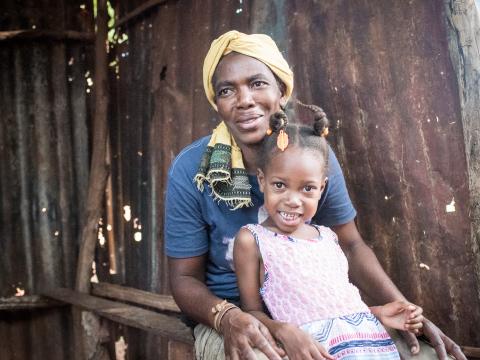World Vision took me out of poverty

Marlène wakes up at 4AM every day in the small town of Palma on the island of La Gonave. She’s 48 years old and takes care, by herself, of her five children and four grandchildren.
“I have been taking care of the children by myself doing all sorts of jobs. I wash clothes, I pick up charcoal, I work the fields…” explains Marlène.
On the island of La Gonave, economic opportunities are rare. Most of the population of about 80,000 inhabitants lives from fishing and agriculture. Unfortunately for Marlène, she can’t do either.
“Often, I would sit home with my head in my hands, not knowing what I am going to feed my children. Sometimes I thought I would go mad,” she shares.
Last year, World Vision conducted a survey and Marlène's family was among the 5,400 families selected to be part of the Emergency Food Security Program. Through this program, families receive food vouchers to buy fresh vegetables, rice, beans and oil among other products.
Marlène started a cooking business after she joined the program. When she receives her food voucher worth 3000 gourdes (approximately 50 USD), she uses a portion of the products to feed her family then uses a portion in a cooking business.

Marlène makes fried patties with herrings, fried bananas, and fried sweet potatoes. Her shop is a metal shack located by the roadside in front of the National School of Palma, which she uses as her kitchen and display stand. Sitting on the wooden bench set for customers, you can see the cars, trucks and motorbikes pass in front of her shop, positioned at the fork in the road.
“The children of the school are my main customers. I come here everyday except for Saturdays and Sundays. If there’s a portion that is not sold, the children can eat it at home,” she explains while the heated oil sizzles.

Marlène also sells pens, pencils and notebooks. She has been able to buy a goat from the income and savings she made from her business. In rural and remote communities such as Palma, buying a goat is a form of investment that families often make in order to support future shocks or upcoming expenses such as school fees.
“World Vision, through the Kore Lavi project, took me out of poverty. I can now send my children to school. I didn’t think I would have made it this year,” she proudly shares.
